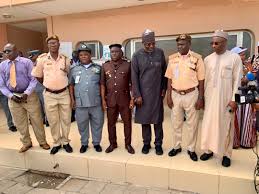The Nigerian Hydrographic Society (NHS) has raised alarm over the state of the nation’s waterways, even as it expressed concern that the waterways have not been surveyed in the past 60 years, stressing that this poses great danger for navigation.
Hydrography is the measurement and description of the features of the sea and coastal areas for the primary purpose of navigation.
The Chairman, Nigerian Hydrographic Society (NHS), Eastern zone, Mr Chikezie Elekwa, said in Lagos that lack of survey had rendered the waterways unsafe for navigation.
The Nigerian Hydrographic Society (NHS) has raised alarm over the state of the nation’s waterways, even as it expressed concern that the waterways have not been surveyed in the past 60 years, stressing that this poses great danger for navigation.
Hydrography is the measurement and description of the features of the sea and coastal areas for the primary purpose of navigation.
The Chairman, Nigerian Hydrographic Society (NHS), Eastern zone, Mr Chikezie Elekwa, said in Lagos that lack of survey had rendered the waterways unsafe for navigation.
“Can you imagine that we still buy our charts from the U.K. These charts have been in existence since the colonial era and this is not supposed to be so”, he lamented.
Elekwa recalled that in 2008, the International Hydrographic Organisation labeled Africa as the least surveyed waters, adding that because of this, ship owners charged higher freight for goods coming to Nigeria.
According to him, this is the reason ship owners bring only their oldest ships to Nigeria.
The hydrographer also said that because there were no maps and charts of the waterways, a ship could be lost.
Elekwa called on the Federal Government to upgrade the Nigerian Navy Hydrographic office to a national office to separate hydrographic services from the administration of the Navy.
“Operationally, the hydrographic service in other countries like South Africa, India and Australia is under the Navy, but funding of hydrographic services is placed under the government.
“Hydrographic services are very strategic to any country. So in order to have cohesion among the operatives who render the service, there is always a national office.
“The national office will also ensure that the hydrographic service rendered to the nation is holistic in nature and meets international standard as laid down by the World Hydrographic body,” Elekwa said.
He said that the navy could not fund the activities of the hydrographic services from its allocation as it was expensive in terms of training, equipment, platforms (survey boats, survey ships and launches).
According to Elekwa, the Nigerian Navy hydrographic service has not done 100 per cent of what it is meant to do.
He lamented that hydrographic services were being contracted out to foreign companies when Nigeria has its own hydrographic service.
“If we have a National Hydrographic office, it would generate its own fund and we can be a leader in our sub-region.
“It is not a money wasting venture, it is a money earner and once it takes off, it will fund itself.
“Ninety per cent of the world’s trade is carried by water. That is why hydrography is given a high premium in any nation except in Nigeria,’’ the NHS boss said.
He said that lack of a national office had made coordination of hydrographic services unattainable.
“The existing hydrographic office has the mandate to coordinate hydrographic services but lack of a holistic policy or law has made sanctioning of offenders difficult,” Elekwa said.
















Discussion about this post